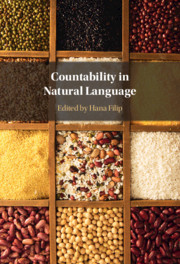Book contents
- Countability in Natural Language
- Countability in Natural Language
- Copyright page
- Contents
- Contributors
- Preface
- Introduction
- 1 Proportional Many/Much and Most
- 2 Quantity Systems and the Count/Mass Distinction
- 3 Counting Aggregates, Groups and Kinds: Countability from the Perspective of a Morphologically Complex Language
- 4 Individuating Matter over Time
- 5 Reduplication as Summation
- 6 Iceberg Semantics for Count Nouns and Mass Nouns: How Mass Counts
- 7 Indexical Inference: Counting and Measuring in Context
- 8 Counting and Measuring and Approximation
- 9 The Count/Mass Distinction for Granular Nouns
- Index
- References
8 - Counting and Measuring and Approximation
Published online by Cambridge University Press: 11 June 2021
- Countability in Natural Language
- Countability in Natural Language
- Copyright page
- Contents
- Contributors
- Preface
- Introduction
- 1 Proportional Many/Much and Most
- 2 Quantity Systems and the Count/Mass Distinction
- 3 Counting Aggregates, Groups and Kinds: Countability from the Perspective of a Morphologically Complex Language
- 4 Individuating Matter over Time
- 5 Reduplication as Summation
- 6 Iceberg Semantics for Count Nouns and Mass Nouns: How Mass Counts
- 7 Indexical Inference: Counting and Measuring in Context
- 8 Counting and Measuring and Approximation
- 9 The Count/Mass Distinction for Granular Nouns
- Index
- References
Summary
Object mass nouns, such as furniture, are mass, but they allow quantity evaluations and comparisons in terms of a cardinal scale. This paper addresses the vexing question of how such cardinal comparisons are possible for object mass nouns, given that, as mass nouns, these expressions are not countable. Building upon her theory of count nouns based on semantic atomicity (entities that are indexed to counting contexts), and on her work on the distinction between counting and measuring and the semantics of measure functions, Rothstein proposes a treatment of quantity evaluations for object mass nouns based on measure comparisons using values on a cardinality scale which, unlike counting does not require access to a set of semantic atoms. Rothstein then extends this analysis and argues that two types of estimation operations have grammatical properties associated with measuring: Russian approximative inversion, and cardinality estimation in Mandarin.
Keywords
- Type
- Chapter
- Information
- Countability in Natural Language , pp. 217 - 251Publisher: Cambridge University PressPrint publication year: 2021
References
- 2
- Cited by

